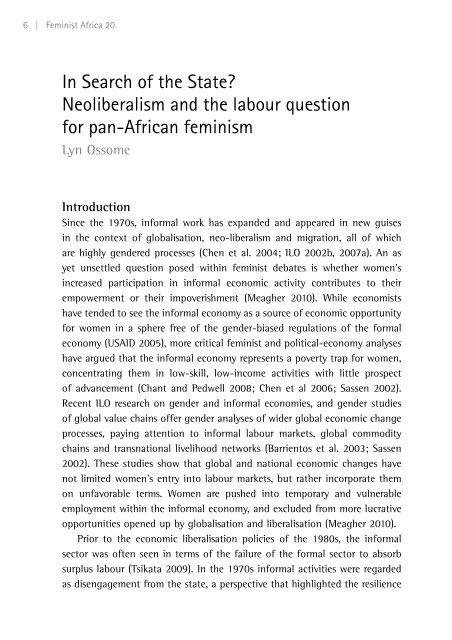You also want an ePaper? Increase the reach of your titles
YUMPU automatically turns print PDFs into web optimized ePapers that Google loves.
6 | Feminist Africa 20<br />
In Search of the State?<br />
Neoliberalism <strong>and</strong> the labour question<br />
for pan-African feminism<br />
Lyn Ossome<br />
Introduction<br />
Since the 1970s, informal work has exp<strong>and</strong>ed <strong>and</strong> appeared in new guises<br />
in the context of globalisation, neo-liberalism <strong>and</strong> migration, all of which<br />
are highly gendered processes (Chen et al. 2004; ILO 2002b, 2007a). An as<br />
yet unsettled question posed within feminist debates is whether women’s<br />
increased participation in informal economic activity contributes to their<br />
empowerment or their impoverishment (Meagher 2010). While economists<br />
have tended to see the informal economy as a source of economic opportunity<br />
for women in a sphere free of the gender-biased regulations of the formal<br />
economy (USAID 2005), more critical feminist <strong>and</strong> political-economy analyses<br />
have argued that the informal economy represents a poverty trap for women,<br />
concentrating them in low-skill, low-income activities with little prospect<br />
of advancement (Chant <strong>and</strong> Pedwell 2008; Chen et al 2006; Sassen 2002).<br />
Recent ILO research on gender <strong>and</strong> informal economies, <strong>and</strong> gender studies<br />
of global value chains offer gender analyses of wider global economic change<br />
processes, paying attention to informal labour markets, global commodity<br />
chains <strong>and</strong> transnational livelihood networks (Barrientos et al. 2003; Sassen<br />
2002). These studies show that global <strong>and</strong> national economic changes have<br />
not limited women’s entry into labour markets, but rather incorporate them<br />
on unfavorable terms. Women are pushed into temporary <strong>and</strong> vulnerable<br />
employment within the informal economy, <strong>and</strong> excluded from more lucrative<br />
opportunities opened up by globalisation <strong>and</strong> liberalisation (Meagher 2010).<br />
Prior to the economic liberalisation policies of the 1980s, the informal<br />
sector was often seen in terms of the failure of the formal sector to absorb<br />
surplus labour (Tsikata 2009). In the 1970s informal activities were regarded<br />
as disengagement from the state, a perspective that highlighted the resilience


